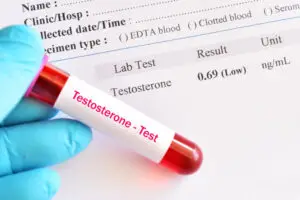Understanding Low Testosterone in Men

Low Testosterone in Men, also known as hypogonadism, is a condition that affects millions of men worldwide. Testosterone is the primary male sex hormone responsible for regulating various bodily functions such as muscle mass, bone density, and sex drive. When the body does not produce enough testosterone, it can lead to a range of physical and emotional symptoms that can significantly impact a man’s quality of life.
In this article, we will delve into the topic of low testosterone in men, discussing its causes, symptoms, and treatment options. We will also explore ways to prevent and manage this condition, allowing men to take control of their health and well-being.
Recognizing Symptoms of Low Testosterone in Men
The symptoms of low testosterone can vary from person to person, and some men may experience more severe symptoms than others. However, there are some common signs that men should be aware of, which may indicate low testosterone levels. These include:
- Decreased sex drive
- Erectile dysfunction
- Fatigue and lack of energy
- Loss of muscle mass
- Increased body fat
- Changes in mood, such as irritability or depression
- Difficulty concentrating
- Hair loss
- Decreased bone density
If you are experiencing any of these symptoms, it is essential to consult with your doctor for proper diagnosis and treatment.
The Role of Age in Low Testosterone Levels
It is natural for testosterone levels to decrease as men age. According to the American Urological Association, testosterone levels decline by about 1% per year after the age of 30. However, if the decline is significant and leads to symptoms, it may be a sign of low testosterone.
Common Causes of Low Testosterone in Men
There are several reasons why a man may have low testosterone levels. Some of the most common causes include:
- Aging: As mentioned earlier, testosterone levels naturally decrease with age.
- Testicular injury or infection: Damage to the testicles can affect their ability to produce testosterone.
- Chronic illness: Certain medical conditions, such as diabetes and liver or kidney disease, can interfere with testosterone production.
- Medications: Some medications, including opioids and steroids, can lower testosterone levels.
- Obesity: Excess body fat can lead to a decrease in testosterone production.
- Hormonal disorders: Conditions such as hypothyroidism and pituitary gland disorders can affect hormone levels.
- Genetic disorders: In rare cases, genetic conditions such as Klinefelter syndrome can cause low testosterone levels.
It is essential to identify the underlying cause of low testosterone to determine the most effective treatment plan.
Low Testosterone in Males Under 30: What You Need to Know
While low testosterone is more commonly associated with older men, it can also affect younger males. Low testosterone in males under 30 can be caused by a variety of factors, including:
- Delayed puberty: Some boys may experience delayed puberty, which can lead to low testosterone levels.
- Testicular cancer: Treatment for testicular cancer, such as chemotherapy or radiation, can damage the testicles and affect testosterone production.
- Anabolic steroid use: The use of anabolic steroids can suppress natural testosterone production.
- Pituitary gland disorders: These conditions can interfere with the production of hormones that stimulate testosterone production.
If you are under 30 and experiencing symptoms of low testosterone, it is crucial to consult with your doctor to determine the cause and develop an appropriate treatment plan.
Ways to Increase Low Testosterone in Males
There are several ways to increase low testosterone levels in men, depending on the underlying cause. Here are some options that your doctor may recommend:
- Testosterone replacement therapy (TRT): This involves administering testosterone through injections, patches, gels, or pellets to increase levels in the body.
- Lifestyle changes: Making healthy lifestyle choices, such as exercising regularly, maintaining a healthy weight, and reducing stress, can help increase testosterone levels.
- Medications: Certain medications, such as clomiphene citrate, can stimulate the production of testosterone in the body.
- Supplements: Some supplements, such as DHEA and zinc, may help boost testosterone levels. However, it is essential to consult with your doctor before taking any supplements.
It is crucial to work closely with your doctor to determine the best course of action for increasing low testosterone levels.
Managing Low Testosterone in Males Under 40
For younger men with low testosterone, managing the condition may involve a combination of lifestyle changes and medical treatment. Here are some tips for managing low testosterone in males under 40:
- Exercise regularly: Regular physical activity can help increase testosterone levels and improve overall health.
- Maintain a healthy weight: Excess body fat can contribute to low testosterone levels, so it is essential to maintain a healthy weight through diet and exercise.
- Get enough sleep: Lack of sleep can affect hormone production, so make sure to get at least 7-9 hours of quality sleep each night.
- Reduce stress: Chronic stress can lead to an increase in cortisol, a hormone that can interfere with testosterone production. Find healthy ways to manage stress, such as meditation or yoga.
- Avoid excessive alcohol consumption: Alcohol can suppress testosterone production, so it is best to limit your intake.
- Quit smoking: Smoking has been linked to lower testosterone levels, so quitting can help improve overall health and hormone balance.
The Impact of Low Testosterone on Men’s Health
Low testosterone can have a significant impact on a man’s physical and emotional well-being. It can lead to a range of health issues, including:
- Reduced muscle mass and strength
- Increased risk of osteoporosis and bone fractures
- Decreased sex drive and erectile dysfunction
- Infertility
- Increased risk of depression and anxiety
- Decreased energy levels and fatigue
- Poor sleep quality
- Increased risk of cardiovascular disease
It is crucial to address low testosterone levels to prevent these health issues and improve overall quality of life.
Understanding Erectile Dysfunction Causes, Symptoms, and Treatment Options
Treatment Options for Low Testosterone in Men
As mentioned earlier, testosterone replacement therapy (TRT) is one of the most common treatment options for low testosterone in men. However, there are other options available, depending on the underlying cause and severity of the condition. These include:
- Testosterone injections: These are typically administered every 2-4 weeks and can help increase testosterone levels.
- Testosterone patches: These are applied daily to the skin and release a steady dose of testosterone into the body.
- Testosterone gels: These are applied daily to the skin and are absorbed into the body through the skin.
- Testosterone pellets: These are implanted under the skin and release testosterone over several months.
- Clomiphene citrate: This medication stimulates the production of hormones that trigger testosterone production.
- Human chorionic gonadotropin (hCG): This hormone is injected into the body and stimulates the testicles to produce testosterone.
- Anastrozole: This medication blocks the conversion of testosterone to estrogen, which can help increase testosterone levels.
It is essential to work closely with your doctor to determine the best treatment option for your specific needs.
Preventing and Managing Low Testosterone in Men
While some causes of low testosterone cannot be prevented, there are steps that men can take to reduce their risk or manage the condition. These include:
- Maintaining a healthy weight through diet and exercise
- Limiting alcohol consumption
- Avoiding anabolic steroid use
- Getting regular check-ups and addressing any underlying medical conditions
- Managing stress through healthy coping mechanisms
- Quitting smoking
- Getting enough quality sleep each night
By taking these steps, men can help prevent low testosterone levels and improve their overall health.
Conclusion: Taking Control of Low Testosterone in Men
Low testosterone is a common condition that can significantly impact a man’s physical and emotional well-being. It is essential to recognize the symptoms and seek proper diagnosis and treatment to manage this condition effectively. By working closely with your doctor and making healthy lifestyle choices, you can take control of low testosterone and improve your overall quality of life. Remember, it is never too late to address low testosterone levels and prioritize your health and well-being.











